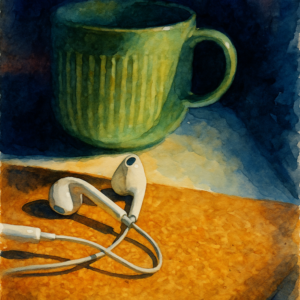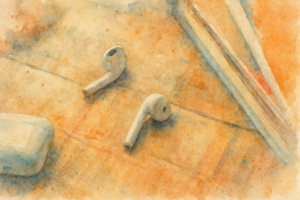Learning with Balades episode 1
Here at the Bitesize French project,
At Bitesize French, we believe listening is essential to unlocking fluency in French. Though I’m not a teacher, I’m excited to share a series on how I internalize podcast content to improve my French skills.
This will also let you tie in different words (adjectives in today’s post), but idioms, expressions, and other grammatical structures in future posts to actual spoken French. We’ll use clips on site from the Balades podcast episode 1 to do this.
Today we’re talking about Adjectives. A cornerstone in any language, without them we don’t get to any describing. And you’ll want to describe things, like saying at the boulangerie that you’d like that baguette dorée svp. Here are some adjectives that come up in the first episode of Balades.
Common Adjectives

première (first)
Find it in Balades episode 1:
“Je me rappelle que ma tante en France redoutait toujours la première journée de retour au travail en janvier après les fêtes.”
(I remember that my aunt in France always dreaded the first day back at work in January after the holidays.)
“Première” is the feminine form of “first,” used here to describe the first day back at work.
The Ordinals up to 5 in French – do you know them all?
1. Premier/Première (First)
Masculine Singular: premier (1er) Example: Le premier livre (The first book)
Feminine Singular: première (1ère) Example: La première maison (The first house)
2. Deuxième/Second(e) (Second)
Masculine/Feminine Singular: deuxième (2e) or second(e) (2d or 2de)
- Example (Masculine): Le deuxième chapitre (The second chapter)
- Example (Feminine): La deuxième semaine (The second week)
- Example (Masculine): Le second jour (The second day)
- Example (Feminine): La seconde chance (The second chance)
3. Troisième (Third)
Masculine/Feminine Singular: troisième (3e)
- Example: Le troisième étage (The third floor)
- Example: La troisième fois (The third time)
4. Quatrième (Fourth)
Masculine/Feminine Singular: quatrième (4e)
- Example: Le quatrième jour (The fourth day)
- Example: La quatrième année (The fourth year)
5. Cinquième (Fifth)
Masculine/Feminine Singular: cinquième (5e)
- Example: Le cinquième mois (The fifth month)
- Example: La cinquième tentative (The fifth attempt)

nouvelle (new)
Find it in Balades episode 1:
“Je vous présente mes meilleurs vœux de bonheur et de santé pour cette nouvelle année.”
“I wish you all the best for a happy and healthy New Year.”
Nouvelle or nouveau or …
The spelling change from “nouveau” to “nouvelle” is due to gender agreement. In French, adjectives must agree in gender and number with the nouns they modify.
“Nouvelle” is the feminine form of “new,” as in the above example from Balades, referring to the new year.
And for masculine nouns in the singular person: “nouveau”. For Example: un nouveau livre (a new book). When it’s modifying a feminine noun in the singular: “nouvelle”. For example: une nouvelle maison (a new house).
Oh and it gets more intersting. When modifying a singular, masculine noun and before a vowel sound or silent ‘H’, we drop the extra letters: “nouvel”. For example: un nouvel ami (a new friend).
For masculine plural nouns we write: “nouveaux”. As an example: de nouveaux livres (new books). And for modifying feminine plural nouns: “nouvelles”. For example: de nouvelles maisons (new houses).
Position of “nouveau” / “nouvelle”
Before the Noun: The adjective “nouveau” typically precedes the noun it modifies. This is a common characteristic of BANGS adjectives in French (Beauty, Age, Number, Goodness, Size). Example: une nouvelle année (a new year)
And sometimes, after the Noun: Although less common, “nouveau” can sometimes appear after the noun, particularly in poetic or literary contexts, but this usage is rare.
Example: l’année nouvelle (the new year – more poetic or formal)
Example: “Art Nouveau”. The well-established term in French that describes a style of art and design that was prominent in the late 19th and early 20th centuries. It is known for its elegant, organic forms and its incorporation of natural elements into art, architecture, and everyday objects. The term remains in use today to describe items or architecture from that period or influenced by that style.

vaste (vast)
Find it in Balades episode 1:
“C’était une grande maison avec un très vaste jardin tout près de la Seine.”
“It was a big house with a very large garden very close to the Seine.”
Explanation: “Vaste” means “vast,” describing the large size of the garden.
Meaning and Usages
Describing Physical Space: C’était une grande maison avec un très vaste jardin tout près de la Seine.” (“It was a big house with a very vast garden near the Seine.”) Here, “vaste” describes the large size of the garden.
Describing Abstract Concepts: “Il a une vaste connaissance en histoire.” (“He has a vast knowledge of history.”) Here, “vaste” is used to describe the extensive scope of his knowledge.
Describing Quantity or Extent: As in: “Le projet nécessite une vaste quantité de ressources.” (“The project requires a vast amount of resources.”) “Vaste” highlights the large quantity of resources needed.
What.. no changing endings?
“Vaste” does not change form based on gender or number. It remains the same whether it modifies a masculine, feminine, singular, or plural noun. Masculine Singular: “Un vaste jardin” (A vast garden) Feminine Singular: “Une vaste région” (A vast region) Masculine Plural: “De vastes projets” (Vast projects) Feminine Plural: “De vastes connaissances” (Vast knowledge)
Hungry for more examples? Read more “vaste” usages…
Common Contexts
- Geographical and Physical Descriptions:
- “Le désert du Sahara est une région vaste et aride.” (The Sahara Desert is a vast and arid region.)
- “Ils ont exploré une vaste étendue de forêt.” (They explored a vast stretch of forest.)
- Abstract and Conceptual Descriptions:
- “Elle a une vaste expérience dans ce domaine.” (She has vast experience in this field.)
- “La bibliothèque contient une vaste collection de livres anciens.” (The library contains a vast collection of ancient books.)
- Formal and Informal Settings:
- “La salle de conférence est vaste et bien équipée.” (The conference room is vast and well-equipped.)
- “Nous avons discuté de manière vaste des différents aspects du projet.” (We discussed the various aspects of the project extensively.)
Examples in Sentences
- Physical Space:
- “Le parc national est une vaste réserve naturelle.” (The national park is a vast nature reserve.)
- “Ils ont acheté une vaste propriété à la campagne.” (They bought a vast property in the countryside.)
- Abstract Concepts:
- “Son esprit est vaste et ouvert à de nouvelles idées.” (His mind is vast and open to new ideas.)
- “Le rapport couvre un vaste éventail de sujets.” (The report covers a vast range of topics.)
- Describing Quantity:
- “La construction du pont a nécessité une vaste quantité de matériaux.” (The construction of the bridge required a vast amount of materials.)
- “Les chercheurs ont collecté une vaste quantité de données.” (The researchers collected a vast amount of data.)

grande (big, large)
Find it in Balades episode 1:
“Bien sûr, vous avez raison, mais quand on travaille dans une grande entreprise avec beaucoup d’employés, cela prend presque toute la matinée.”
“Of course, you’re right, but when you work in a large company with lots of employees, it takes most of the morning.”
Explanation: “Grande” is the feminine form of “big” or “large,” describing the size of the house. This adjective can also be used as a descriptor for: Size or magnitutde, height, expressing importance or greatness, and indicating age or a stage of life.
Read on for more examples not in this podcast:
Common Contexts
- Describing Physical Size or Height:
- Example (Masculine): “Ils ont planté de grands arbres dans le jardin.” (They planted tall trees in the garden.)
- Example (Feminine): “Elle porte une grande robe blanche.” (She is wearing a large white dress.)
- Describing Importance or Renown:
- Example (Masculine): “C’est un grand écrivain.” (He is a great writer.)
- Example (Feminine): “Elle est une grande figure de la politique.” (She is a prominent figure in politics.)
- Expressing Adulthood or Growth:
- Example (Masculine): “Quand tu seras grand, tu pourras conduire.” (When you are grown up, you can drive.)
- Example (Feminine): “Les enfants deviendront grands un jour.” (The children will grow up one day.)
Examples in Sentences
- Physical Size:
- “Le grand chien court dans le parc.” (The big dog runs in the park.)
- “La grande table est dans la salle à manger.” (The large table is in the dining room.)
- Height:
- “Il est grand et musclé.” (He is tall and muscular.)
- “Elle est grande pour son âge.” (She is tall for her age.)
- Importance or Greatness:
- “Victor Hugo est un grand auteur français.” (Victor Hugo is a great French author.)
- “Marie Curie est une grande scientifique.” (Marie Curie is a great scientist.)
- Age or Growth:
- “Quand tu seras grand, tu feras ce que tu veux.” (When you are grown up, you will do what you want.)
- “Les grandes personnes doivent montrer l’exemple.” (Grown-ups must set an example.)

beau (beautiful)
Listen for it in Balades episode 1:
“Non seulement, j’ai à nouveau un beau bureau bien rangé, où tout est à sa place…”
“Not only do I have a nice, tidy desk again, where everything is in its place…”
Explanation: “Beau” is the masculine form of “beautiful,” used to describe the neat and well-organized desk.
“Beau” is a common French adjective meaning “beautiful,” “handsome,” or “fine.” It is used to describe aesthetic qualities and can apply to people, places, objects, and more. “Beau” has various forms to agree with the gender and number of the noun it modifies. Additionally, “beau” can function as a noun in certain contexts.
“Beau,” “bel,” and “belle” are different forms of the same adjective in French, and they are used to ensure proper agreement with the gender and number of the noun they modify, as well as to facilitate pronunciation.
Forms of “beau”
- Masculine Singular: beau Example: un beau jardin (a beautiful garden)
- Masculine Singular Before a Vowel or Silent ‘H’: bel Example: un bel homme (a handsome man)
- Feminine Singular: belle Example: une belle maison (a beautiful house)
- Masculine Plural: beaux Example: de beaux jardins (beautiful gardens)
- Feminine Plural: belles Example: de belles fleurs (beautiful flowers)
Grammar and Agreement
- Gender and Number Agreement: “Beau” changes form to agree with the gender and number of the noun it modifies.
- Position in Sentence: “Beau” is typically placed before the noun it modifies.
Examples in Sentences
- Masculine Singular:
- Sentence: “Il a un beau sourire.” (He has a handsome smile.)
- Explanation: “Beau” modifies “sourire” (smile), which is masculine singular.
- Masculine Singular Before a Vowel:
- Sentence: “C’est un bel endroit.” (It’s a beautiful place.)
- Explanation: “Bel” is used instead of “beau” before a noun starting with a vowel sound.
- Feminine Singular:
- Sentence: “Elle porte une belle robe.” (She is wearing a beautiful dress.)
- Explanation: “Belle” modifies “robe” (dress), which is feminine singular.
- Masculine Plural:
- Sentence: “Les beaux jours arrivent.” (The beautiful days are coming.)
- Explanation: “Beaux” modifies “jours” (days), which is masculine plural.
- Feminine Plural:
- Sentence: “Elles ont de belles voix.” (They have beautiful voices.)
- Explanation: “Belles” modifies “voix” (voices), which is feminine plural.
You gotta be kidding me, “beau” can be a noun, too?
“Beau” can also function as a noun in certain contexts, often in familial terms or idiomatic expressions.
- As a Family Term:
- Beau-père: Father-in-law or stepfather
- Example: “Mon beau-père est très gentil.” (My father-in-law is very kind.)
- Beau-frère: Brother-in-law
- Example: “J’ai un bon rapport avec mon beau-frère.” (I have a good relationship with my brother-in-law.)
- Beau-fils: Stepson or son-in-law
- Example: “Mon beau-fils habite avec nous.” (My stepson lives with us.)
- Beau-fille: Stepdaughter or daughter-in-law
- Example: “Ma belle-fille est médecin.” (My daughter-in-law is a doctor.)
- Beaux-parents: In-laws or stepparents
- Example: “Nous passons Noël avec mes beaux-parents.” (We spend Christmas with my in-laws.)
- Beau-père: Father-in-law or stepfather
- In Idiomatic Expressions:
- Le beau: Refers to beauty or aesthetics
- Example: “Le beau est subjectif.” (Beauty is subjective.)
- Le beau: Refers to beauty or aesthetics

propre (clean)
Listen for it in Balades episode 1:
“Une fois que tout était bien propre, on remettait les nénuphars et commençait à remplir à nouveau le bassin.”
“Once everything was nice and clean, we’d put the water lilies back and start filling the pond again.”
Explanation: “Propre” means “clean,” describing the state of the pond after cleaning.
Position Matters:
The meaning of “propre” changes significantly depending on whether it precedes or follows the noun.
Before the Noun: Indicates possession or belonging. Example: “C’est ma propre décision.” (It’s my own decision.) And after the Noun it can indicates cleanliness or neatness. Example: “La salle est propre.” (The room is clean.)
Usage in Different Contexts:
Around the home, it’s often used to describe the cleanliness of a place or object. Example: “Les enfants doivent garder leurs chambres propres.” (The children must keep their rooms clean.)
For personal possessions: We use “propre” to emphasize personal ownership. Example: “Elle a écrit son propre livre.” (She wrote her own book.)
Formal and Informal Settings:
“Propre” can be used in both formal and informal contexts. In formal writing, it often emphasizes personal achievement or individual possession. Example: “Chaque élève a sa propre méthode d’étude.” (Each student has their own study method.) In informal settings, it’s commonly used to talk about cleanliness. Example: “Peux-tu nettoyer ta propre assiette?” (Can you clean your own plate?)
Read on for different endings and even more contextual examples:
Grammar and Agreement
- Gender and Number Agreement: “Propre” remains the same whether it modifies a masculine or feminine noun, and whether the noun is singular or plural.
- Masculine Singular: propre
- Example: “Un bureau propre” (A clean desk)
- Feminine Singular: propre
- Example: “Une maison propre” (A clean house)
- Masculine Plural: propres
- Example: “Des bureaux propres” (Clean desks)
- Feminine Plural: propres
- Example: “Des maisons propres” (Clean houses)
- Masculine Singular: propre
Examples in Sentences
- Propre (Clean):
- Masculine Singular:
- Sentence: “Il a un bureau propre.” (He has a clean desk.)
- Explanation: “Propre” follows “bureau” and means clean.
- Feminine Singular:
- Sentence: “Elle a une cuisine propre.” (She has a clean kitchen.)
- Explanation: “Propre” follows “cuisine” and means clean.
- Masculine Plural:
- Sentence: “Ils ont des vêtements propres.” (They have clean clothes.)
- Explanation: “Propre” follows “vêtements” and means clean.
- Feminine Plural:
- Sentence: “Elles ont des chambres propres.” (They have clean rooms.)
- Explanation: “Propre” follows “chambres” and means clean.
- Masculine Singular:
More challenging Adjectives

mielleux (sweet)
Listen for it in Balades episode 1:
“Un sourire mielleux sur les lèvres.”
“A cheesy smile on their lips.”
When describing someone, overly sweet, often (perceived as) insincere
“Mielleux” often implies that the sweetness is excessive and that it lacks authenticity. It is typically used to describe attitudes, behaviors, or expressions that are intended to charm or flatter but come off as insincere.
It’s commonly used to describe interactions where someone is being overly flattering or ingratiating. Example: “Son comportement mielleux a fini par agacer tout le monde.” (His smarmy behavior eventually annoyed everyone.)
Use it to paint a vivid picture of someone’s insincere behavior or speech. Example: “Elle a répondu avec une voix mielleuse qui sonnait faux.” (She responded with a saccharine voice that sounded fake.)
Some Synonyms: Hypocrite (Hypocritical): Example: “Il est hypocrite et mielleux.” (He is hypocritical and smarmy.) Flatteur/Flatteuse (Flattering, Insincerely Flattering): Example: “Ses paroles flatteuses et mielleuses étaient difficiles à croire.” (His flattering and smarmy words were hard to believe.) Douceâtre (Sickly Sweet): Example: “Son sourire douceâtre était tout sauf sincère.” (His sickly sweet smile was anything but sincere.)
“Mielleux” is an expressive French adjective used to describe someone or something that is overly sweet in an insincere or ingratiating way. It can refer to both literal qualities (reminiscent of honey) and figurative attributes (smarmy or saccharine behavior). Understanding its nuances and usage will help you accurately describe behaviors and expressions that are excessively and often annoyingly sweet.
Dive into endings and agreement and more examples:
Grammar and Agreement
- Gender and Number Agreement: “Mielleux” changes form to agree with the gender and number of the noun it modifies.
- Masculine Singular: mielleux
- Example: “Un discours mielleux” (A smarmy speech)
- Feminine Singular: mielleuse
- Example: “Une voix mielleuse” (A saccharine voice)
- Masculine Plural: mielleux
- Example: “Des compliments mielleux” (Smarmy compliments)
- Feminine Plural: mielleuses
- Example: “Des paroles mielleuses” (Saccharine words)
- Masculine Singular: mielleux
Examples in Sentences
- Masculine Singular:
- Sentence: “Il a un ton mielleux qui m’irrite.” (He has a smarmy tone that irritates me.)
- Explanation: “Mielleux” modifies “ton” (tone), which is masculine singular.
- Feminine Singular:
- Sentence: “Elle m’a fait une remarque mielleuse.” (She made a saccharine remark to me.)
- Explanation: “Mielleuse” modifies “remarque” (remark), which is feminine singular.
- Masculine Plural:
- Sentence: “Ses mots mielleux ne me convainquent pas.” (His smarmy words do not convince me.)
- Explanation: “Mielleux” modifies “mots” (words), which is masculine plural.
- Feminine Plural:
- Sentence: “Les excuses mielleuses de l’enfant n’ont pas trompé ses parents.” (The child’s saccharine apologies did not fool his parents.)
- Explanation: “Mielleuses” modifies “excuses” (apologies), which is feminine plural.

léger (light)
Listen for it in Balades episode 1:
“C’est donc avec le cœur léger et l’esprit libéré que je commence cette nouvelle année.”
“So it is with a light heart and a liberated mind that I begin this new year.”
In Context
Describes a feeling of lightness and freedom, both physically and emotionally.
Physical Lightness (Light in Weight): Meaning: Used to describe something that is not heavy. Example: “Un sac léger” (A light bag) Explanation: Describes the bag as not heavy.
Use it to describe something that is not intense or severe. A figurative lightness as in slight or gentle. Example: “Un léger vent” (A gentle breeze)
Use it to describe something minor or insignificant. Example: “Une légère différence” (A slight difference)
That feeling of being lighthearted or carefree: Example: “Il se sent léger après ses vacances.” (He feels light after his vacation.)
Common Phrases
“Léger comme une plume” (Light as a feather)Example: “Ce coussin est léger comme une plume.” (This cushion is light as a feather.)
“Prendre à la légère” (To take lightly): As in to not take something seriously. Example: “Il ne faut pas prendre cette situation à la légère.” (One should not take this situation lightly.)
Dive into agreement and placement and more examples of usage
Grammar and Agreement
- Gender and Number Agreement: “Léger” changes form to agree with the gender and number of the noun it modifies.
- Masculine Singular: léger
- Example: “Un repas léger” (A light meal)
- Feminine Singular: légère
- Example: “Une brise légère” (A gentle breeze)
- Masculine Plural: légers
- Example: “Des sacs légers” (Light bags)
- Feminine Plural: légères
- Example: “Des robes légères” (Light dresses)
- Masculine Singular: léger
Examples in Sentences
- Physical Lightness:
- Masculine Singular:
- Sentence: “Ce tissu est très léger.” (This fabric is very light.)
- Explanation: “Léger” modifies “tissu” (fabric), which is masculine singular.
- Feminine Singular:
- Sentence: “Elle porte une chemise légère.” (She is wearing a light shirt.)
- Explanation: “Légère” modifies “chemise” (shirt), which is feminine singular.
- Masculine Plural:
- Sentence: “Les cartons sont légers.” (The boxes are light.)
- Explanation: “Légers” modifies “cartons” (boxes), which is masculine plural.
- Feminine Plural:
- Sentence: “Ces couvertures sont légères.” (These blankets are light.)
- Explanation: “Légères” modifies “couvertures” (blankets), which is feminine plural.
- Masculine Singular:
- Figurative Lightness:
- Masculine Singular:
- Sentence: “Il y a un léger changement dans le programme.” (There is a slight change in the schedule.)
- Explanation: “Léger” describes the change as minor.
- Feminine Singular:
- Sentence: “Elle a une légère préférence pour le chocolat.” (She has a slight preference for chocolate.)
- Explanation: “Légère” describes the preference as not strong.
- Masculine Singular:
- Feeling or State:
- Masculine Singular:
- Sentence: “Après l’exercice, il se sent léger.” (After the exercise, he feels light.)
- Explanation: “Léger” describes the feeling of being unburdened.
- Feminine Singular:
- Sentence: “Elle a le cœur léger après avoir reçu de bonnes nouvelles.” (She feels lighthearted after receiving good news.)
- Explanation: “Léger” (with “cœur” being understood) describes the emotional state of feeling happy and unburdened.
- Masculine Singular:

libéré (liberated)
Listen for it in Balades episode 1 in the same clip as above:
“C’est donc avec le cœur léger et l’esprit libéré que je commence cette nouvelle année.”
“So it is with a light heart and a liberated mind that I begin this new year.”
Context
This adjective conveys a sense of liberation, being free from worries or burdens.
While derived from the verb “libérer,” its use here is as an adjective not the past participle that it can be in other contexts. There are no helper verbs to make it a past participle and this directly modifies the masculine noun “l’esprit”. It can describe both literal and figurative states of being freed from physical, emotional, or situational constraints.
Literal Meaning (Freed from Physical Constraint): Describe someone or something that has been set free from physical confinement or restriction. Example: “Le prisonnier a été libéré.” (The prisoner was freed.)
Figurative Meaning (Freed from Emotional or Situational Constraint): Describe a state of being free from emotional burdens, obligations, or restrictions. Example: “Elle se sent libérée après la fin de son contrat.” (She feels liberated after the end of her contract.)
A useful idiom from this adjective
“Se sentir libéré(e) comme un oiseau”: To feel as free as a bird. Example: “Après ses examens, il se sent libéré comme un oiseau.” (After his exams, he feels as free as a bird.)
Read more for agreement and many more contextual examples:
Grammar and Agreement
- Gender and Number Agreement: “Libéré” changes form to agree with the gender and number of the noun it modifies.
- Masculine Singular: libéré
- Example: “Il se sent libéré.” (He feels liberated.)
- Feminine Singular: libérée
- Example: “Elle se sent libérée.” (She feels liberated.)
- Masculine Plural: libérés
- Example: “Les prisonniers ont été libérés.” (The prisoners were freed.)
- Feminine Plural: libérées
- Example: “Les âmes libérées étaient en paix.” (The freed souls were at peace.)
- Masculine Singular: libéré
Examples in Sentences
- Literal Freedom:
- Masculine Singular:
- Sentence: “Le captif a été libéré après des années de détention.” (The captive was freed after years of detention.)
- Explanation: “Libéré” describes the captive being set free.
- Feminine Singular:
- Sentence: “La prisonnière a été libérée pour bonne conduite.” (The prisoner was freed for good behavior.)
- Explanation: “Libérée” describes the prisoner being released.
- Masculine Plural:
- Sentence: “Les otages ont été libérés par leurs ravisseurs.” (The hostages were freed by their captors.)
- Explanation: “Libérés” describes the hostages being set free.
- Feminine Plural:
- Sentence: “Les prisonnières ont été libérées à la fin de la guerre.” (The female prisoners were freed at the end of the war.)
- Explanation: “Libérées” describes the female prisoners being released.
- Masculine Singular:
- Figurative Freedom:
- Masculine Singular:
- Sentence: “Après des années de travail acharné, il se sent enfin libéré.” (After years of hard work, he finally feels liberated.)
- Explanation: “Libéré” describes the feeling of being free from stress or burden.
- Feminine Singular:
- Sentence: “Elle se sent libérée après avoir terminé ses études.” (She feels liberated after finishing her studies.)
- Explanation: “Libérée” describes the feeling of relief and freedom from academic obligations.
- Masculine Plural:
- Sentence: “Ils se sentent libérés après la réussite de leur projet.” (They feel liberated after the success of their project.)
- Explanation: “Libérés” describes the feeling of freedom and accomplishment.
- Feminine Plural:
- Sentence: “Elles se sentent libérées de leurs responsabilités.” (They feel freed from their responsibilities.)
- Explanation: “Libérées” describes the feeling of being relieved from duties or obligations.
- Masculine Singular:

mal luné (in a bad mood)
Listen for it in Balades episode 1:
“Non, il y a aussi le chef qui en temps normal s’enferme toujours mal luné dans son bureau.”
“No, there’s also the boss, who normally locks himself in his office in a bad mood.”
Contextual Explanation: Refers to being in a bad mood, combining “mal” (bad) with “luné” (mood-related term).
Idiomatic Expression: “Mal luné” is an idiomatic expression meaning (being in a bad mood).
Origins and Etymology
- Lune (Moon):
- Meaning: The French word “lune” means “moon.”
- Etymology: The expression “mal luné” comes from an old belief that one’s mood could be influenced by the phases of the moon. If someone was “badly mooned” (mal luné), it was believed that the moon’s influence was negative, causing them to be in a bad mood.
- Luné:
- Meaning: The term “luné” is derived from “lune” and is used in this idiomatic expression to describe a state influenced by the moon.
- Context: While “luné” itself is not commonly used outside of this expression, “mal luné” has become a standard way to describe someone who is grumpy or in a bad mood.
Usage of “Mal Luné”
Describing Mood:
- Masculine Singular: mal luné
- Example: “Il est mal luné aujourd’hui.” (He is in a bad mood today.)
- Feminine Singular: mal lunée
- Example: “Elle est mal lunée ce matin.” (She is in a bad mood this morning.)
- Masculine Plural: mal lunés
- Example: “Ils sont mal lunés après la réunion.” (They are in a bad mood after the meeting.)
- Feminine Plural: mal lunées
- Example: “Les filles sont mal lunées aujourd’hui.” (The girls are in a bad mood today.)

heureux (happy)
- Sentence: “Tous font la ronde et vous souhaitent une bonne et heureuse année un sourire mielleux sur les lèvres.”
“Heureux” is a French adjective meaning “happy” or “fortunate.” It is used to describe a state of happiness, contentment, or good fortune. Here’s a detailed look at its usage, forms, and nuances:
Forms of “Heureux”
Masculine Singular: heureux Example: “Il est très heureux.” (He is very happy.)
Feminine Singular: heureuse Example: “Elle est très heureuse.” (She is very happy.)
Masculine Plural: heureux Example: “Ils sont très heureux.” (They are very happy.)
Feminine Plural: heureuses Example: “Elles sont très heureuses.” (They are very happy.)
Grammar and Agreement
“Heureux” changes form to agree with the gender and number of the noun it modifies.
Masculine Singular: heureux Example: “Un homme heureux.” (A happy man.)
Feminine Singular: heureuse Example: “Une femme heureuse.” (A happy woman.)
Masculine Plural: heureux Example: “Des hommes heureux.” (Happy men.)
Feminine Plural: heureuses Example: “Des femmes heureuses.” (Happy women.)
Common Expressions
Être heureux de”: To be happy about. Example: “Je suis heureux de te rencontrer.” (I am happy to meet you.)
“Heureux comme un poisson dans l’eau”: As happy as a clam (literally: as happy as a fish in water). Example: “Il est heureux comme un poisson dans l’eau dans sa nouvelle maison.” (He is as happy as a clam in his new home.)
“Vivre heureux”: To live happily. Example: “Ils vécurent heureux jusqu’à la fin de leurs jours.” (They lived happily ever after.)
Improving your French Listening Comprehension with Podcasts
On this site, fast spoken French is finally accessible to all levels. The tool break podcasts into short clips each set to transcription fill-in-the-blank practice. My favorite practice in class is always dictées. While they can seem overwhelming at first, the confidence boost and skills payoff for doing the work pays off. They’re perfect for anyone at any level, from advanced students to those just starting.
We use podcasts and our practice exercises to make it possible for anyone, anywhere to immerse in French with fun and ease. Join us and enjoy French, one short clip at a time. Let’s learn together!
Make the most of the site:
- Daily Podcast Listening: Start your day with a French podcast from our collection. Choose episodes that align with your interests to keep it engaging.
- Active Listening Practice: As you listen, try to pick out key phrases and vocabulary. Use our daily quizzes to test your understanding and reinforce learning.
- Repeat and Shadow: Listen to the same podcast segment multiple times. Try to mimic the pronunciation and intonation to improve your spoken French.
- Note-taking: Jot down new words or phrases you encounter. Review these notes regularly to enhance vocabulary retention.
- Reflect and Respond: After each episode, summarize the main points in French, either in writing or aloud. This helps in consolidating your learning and improving your expressive skills.
- Read More:
- True Beginner or A1 Learners: discover tips learning with podcasts at an introductory level.
- Discover all the podcast clips on FrenchIRL organized by level.
- Top Tips: Here’s how I make the most of my own site.
I created the French In Real Life project because I wanted to understand more than just my teacher and youtubers who cater to learners. I wanted to understand the French I hear in France. I hope you can benefit as much as I have. Become a supporting member for access to all clips.
Make it stick
This was a quick look at some common and less common adjectives, please share below what is opening up from it!
Using a podcast to learn French always starts with listening. Hear what you already know and listen for what’s new. Then dive deep into the words that are new and start fresh.
By using our short clips and transcription quizzes, you’ll amaze yourself by what you can pick up.
Adjectives remain an essential part of the language, and French makes them tricky with agreement, number, and idioms… but it’s not out of reach. Listen and stay curious!








